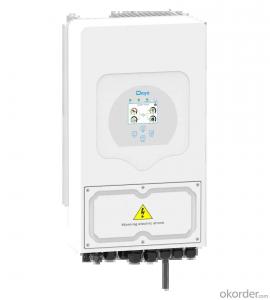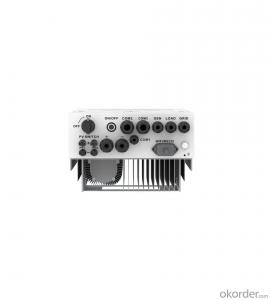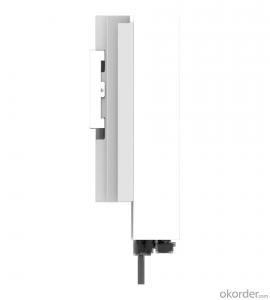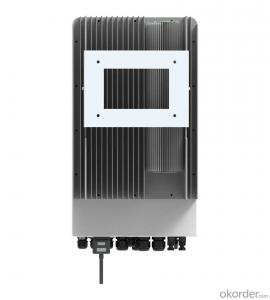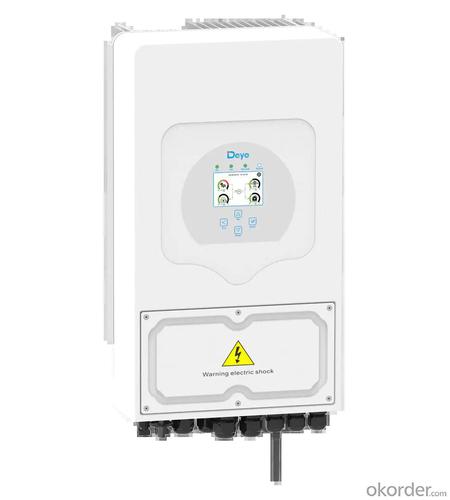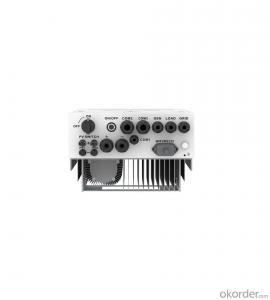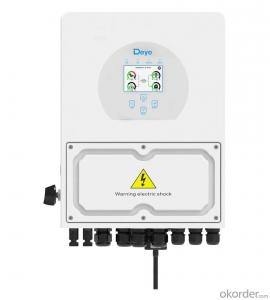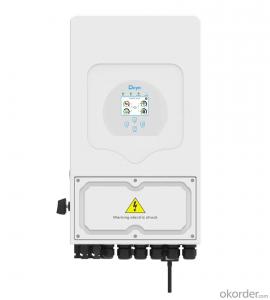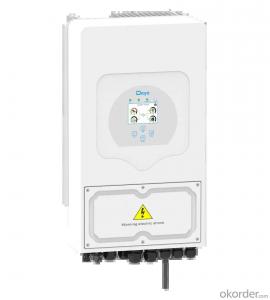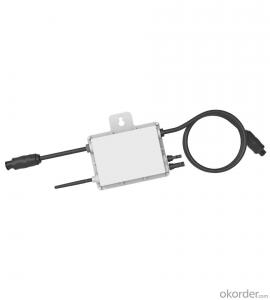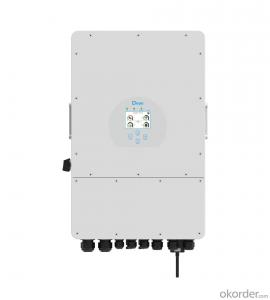Solar Inverter Charger 12v - Sun-3.6-SG03LP1-EU Single Phase 2 MPPT Hybrid Inverter with Low Voltage Battery
- Loading Port:
- Ningbo
- Payment Terms:
- TT OR LC
- Min Order Qty:
- 100 pc
- Supply Capability:
- 5000 pc/month
OKorder Service Pledge
OKorder Financial Service
You Might Also Like
Specification
SUN 6K-SG,hybrid inverter, is suitable for residential and light commercial use, maximizing self-consumption rate of solar energy and increasing your energy impendence. During the day, the PV system generates electricity which will be provided to the loads initially. Then, the excess energy will charge the battery via SUN 6K-SG. Finally, the stored energy can be released when the loads require it. The battery can also be charged by the diesel generator to ensure uninterrupted supply in the event of grid blackout.
100% unbalanced output, each phase; Max. output up to 50% rated power
DC couple and AC couple to retrofit existing solar system
Max. 16pcs parallel for on-grid and off-grid operation; Support multiple batteries parallel
Max. charging/discharging current of 240A
48V low voltage battery, transformer isolation design
6 time periods for battery charging/discharging
| Model | SUN-3.6K -SG03LP1-EU | |
| Battery Input Data | Battery Input Data | |
| Battery Type | Lead-acid or Li-lon | |
| Battery Voltage Range (V) | 40~60 | |
| Max. Charging Current (A) | 90 | |
| Max. Discharging Current (A) | 90 | |
| External Temperature Sensor | Yes | |
| Charging Curve | 3 Stages / Equalization | |
| Charging Strategy for Li-Ion Battery | Self-adaption to BMS | |
| PV String Input Data | ||
| Max. DC Input Power (W) | 4680 | |
| Rated PV Input Voltage (V) | 370 (125~500) | |
| Start-up Voltage (V) | 125 | |
| MPPT Voltage Range (V) | 150-425 | |
| Full Load DC Voltage Range (V) | 300-425 | |
| PV Input Current (A) | 13+13 | |
| Max. PV ISC (A) | 17+17 | |
| Number of MPPT / Strings per MPPT | 2/1+1 | |
| AC Output Data | ||
| Rated AC Output and UPS Power (W) | 3600 | |
| Max. AC Output Power (W) | 3690 | |
| AC Output Rated Current (A) | 16.4 | |
| Max. AC Current (A) | 18 | |
| Max. Continuous AC Passthrough (A) | 35 | |
| Peak Power (off grid) | 2 time of rated power, 10 S | |
| Power Factor | 0.8 leading to 0.8 lagging | |
| Output Frequency and Voltage | 50/60Hz; L/N/PE 220/230Vac (single phase) | |
| Grid Type | Single Phase | |
| DC injection current (mA) | THD<3% (Linear load<1.5%)< td=""> | |
| Efficiency | ||
| Max. Efficiency | 97.60% | |
| Euro Efficiency | 97.00% | |
| MPPT Efficiency | 99.90% | |
| Protection | ||
| Integrated | PV Input Lightning Protection, Anti-islanding Protection, PV String Input Reverse Polarity Protection, Insulation Resistor Detection, Residual Current Monitoring Unit, Output Over Current Protection, Output Shorted Protection, Surge protection | |
| Output Over Voltage Protection | DC Type II/AC Type III | |
| Certifications and Standards | ||
| Grid Regulation | CEI 0-21, VDE-AR-N 4105, NRS 097, IEC 62116, IEC 61727, G99, G98, VDE 0126-1-1, RD 1699, C10-11 | |
| Safety EMC / Standard | IEC/EN 61000-6-1/2/3/4, IEC/EN 62109-1, IEC/EN 62109-2 | |
| General Data | ||
| Operating Temperature Range (℃) | -45~60℃, >45℃ derating | |
| Cooling | Natural cooling | |
| Noise (dB) | <30 dB | |
| Communication with BMS | RS485; CAN | |
| Weight (kg) | 20.5 | |
| Size (mm) | 330W x 580H x232D IP65 | |
| Protection Degree | IP65 | |
| Installation Style | Wall-mounted | |
| Warranty | 5 years | |
- Q: How does a solar inverter affect the overall system cost?
- A solar inverter can increase the overall system cost as it is a crucial component responsible for converting the DC electricity generated by solar panels into AC electricity for use in homes and businesses. The efficiency, capacity, and quality of the inverter can influence the system's performance and reliability. Higher-quality inverters with advanced features tend to be more expensive, but they can maximize energy production and improve system durability, potentially offsetting the initial cost through increased energy savings over time.
- Q: What is the difference between a string inverter and a micro inverter?
- A string inverter is a type of inverter that is connected to a string of solar panels, converting the DC power generated by the panels into AC power for use in the electrical grid. On the other hand, a micro inverter is a smaller and individual inverter that is attached to each solar panel, converting the DC power directly at the panel level. The main difference between the two is that a string inverter operates at the string level, which means if one panel in the string is affected by shade or malfunction, the entire string's performance is affected. In contrast, with micro inverters, each panel operates independently, allowing for higher energy production and better performance in situations where panels are subjected to shading or varying conditions.
- Q: How does the harmonic distortion affect the performance of a solar inverter?
- Harmonic distortion can have a negative impact on the performance of a solar inverter. It can lead to increased heat generation, reduced efficiency, and can even cause damage to the inverter components. Additionally, harmonic distortion can introduce electrical noise into the system, which can affect the quality of the output waveform and potentially interfere with other connected devices. Therefore, minimizing harmonic distortion is important to ensure optimal performance and reliable operation of a solar inverter.
- Q: What are the key features to consider when purchasing a solar inverter?
- When purchasing a solar inverter, some key features to consider are the capacity and efficiency of the inverter, its compatibility with your solar panel system, the type of inverter technology used (such as string or microinverters), the warranty and reliability of the brand, and any additional features or smart capabilities offered by the inverter.
- Q: Can a solar inverter be used with different monitoring platforms?
- Yes, a solar inverter can be used with different monitoring platforms as long as the monitoring platforms are compatible with the inverter's communication protocols and data formats.
- Q: Is it possible to upgrade my existing solar inverter without replacing the entire system?
- Yes, it is possible to upgrade an existing solar inverter without replacing the entire system. In many cases, solar inverters can be upgraded by simply replacing the existing inverter with a newer model that offers more advanced features or higher capacity. However, it is important to consult with a professional solar installer to determine the compatibility of the new inverter with your current system and ensure a successful upgrade.
- Q: Can a solar inverter be used with a solar water pumping system?
- Yes, a solar inverter can be used with a solar water pumping system. The solar inverter converts the DC power generated by the solar panels into AC power, which is required to operate the water pump. This allows for the efficient and reliable operation of the solar water pumping system using solar energy.
- Q: How does a solar inverter protect against overvoltage or overcurrent?
- A solar inverter protects against overvoltage or overcurrent by continuously monitoring the electrical output from the solar panels. If the voltage or current exceeds the safe operating limits, the inverter automatically adjusts the output or shuts down to prevent damage to the system. It achieves this through built-in protective mechanisms such as surge protectors, voltage regulators, and circuit breakers.
- Q: Can a solar inverter be used in systems with different module strings?
- Yes, a solar inverter can be used in systems with different module strings. Solar inverters are designed to convert the direct current (DC) generated by solar panels into alternating current (AC) that can be used to power homes or businesses. They are typically compatible with a wide range of module string configurations, allowing for flexibility in system design and installation. However, it is important to ensure that the solar inverter's power rating and specifications are suitable for the combined power output of the module strings to ensure optimal performance.
- Q: Can a solar inverter be used with different types of solar PV systems (roof-mounted, ground-mounted, etc.)?
- Yes, a solar inverter can be used with different types of solar PV systems, including roof-mounted, ground-mounted, and other variations. The primary function of a solar inverter is to convert the direct current (DC) electricity generated by solar panels into alternating current (AC) electricity that can be used to power appliances and feed into the electrical grid. This conversion process remains consistent regardless of the type of PV system being used. However, it's important to note that the specific requirements and specifications of the solar inverter may vary depending on the type of PV system. Different PV systems may have varying voltage and power outputs, which may require specific inverter models capable of handling those specific requirements. For example, ground-mounted solar systems may have larger arrays and higher power outputs compared to roof-mounted systems, necessitating a different inverter. Therefore, while a solar inverter can generally be used with different types of solar PV systems, it is crucial to choose an inverter that is compatible with the specific system's voltage, power output, and other technical specifications. It is always recommended to consult with a professional solar installer or technician to ensure the proper selection and installation of the solar inverter for your specific PV system.
Send your message to us
Solar Inverter Charger 12v - Sun-3.6-SG03LP1-EU Single Phase 2 MPPT Hybrid Inverter with Low Voltage Battery
- Loading Port:
- Ningbo
- Payment Terms:
- TT OR LC
- Min Order Qty:
- 100 pc
- Supply Capability:
- 5000 pc/month
OKorder Service Pledge
OKorder Financial Service
Similar products
Hot products
Hot Searches
Related keywords
